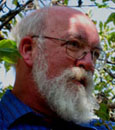
Daniel C. Dennett
Tuesday, 15 December 2009 at 18:00 in the Print Media Academy Kurfürstenanlage 52-60, Heidelberg
Mit freundlicher Unterstützung der Manfred Lautenschläger Stiftung in Zusammenarbeit mit dem Netzwerk Alternsforschung
Professor Daniel C. Dennett, Tufts University
The Evolution of Religions
Abstract
Today's organized religions are the latest descendants of thousands of religions that have flourished before, and many of their idiosyncratic features are probably superannuated adaptations that helped them thrive in earlier environments. The first religions were like synanthropic species - rats, squirrels, pigeons, cockroaches - wild species that were designed by natural selection to thrive in human company. Some strains have since been domesticated, and like domesticated animals, they differ systematically from their nearest relatives, while still maintaining many of the features that made their ancestors so robust.
Biography
Daniel C. Dennett, the author of Breaking the Spell (Viking, 2006), Freedom Evolves (Viking Penguin, 2003) and Darwin's Dangerous Idea (Simon &Schuster, 1995), is University Professor and Austin B. Fletcher Professor of Philosophy, and Co-Director of the Center for Cognitive Studies at Tufts University. He lives with his wife in North Andover, Massachusetts, and has a daughter, a son, and three grandchildren. He was born in Boston in 1942, the son of a historian by the same name, and received his B.A. in philosophy from Harvard in 1963. He then went to Oxford to work with Gilbert Ryle, under whose supervision he completed the D.Phil. in philosophy in 1965. He taught at U.C. Irvine from 1965 to 1971, when he moved to Tufts, where he has taught ever since, aside from periods visiting at Harvard, Pittsburgh, Oxford, and the École Normale Supérieure in Paris.
His first book, Content and Consciousness, appeared in 1969, followed by Brainstorms (1978), Elbow Room (1984), The Intentional Stance (1987), Consciousness Explained (1991), Darwin's Dangerous Idea (1995), Kinds of Minds (1996), and Brainchildren: A Collection of Essays 1984-1996 (MIT Press and Penguin, 1998). Sweet Dreams: Philosophical Obstacles to a Science of Consciousness was published in 2005 by MIT Press. He co-edited The Mind's I with Douglas Hofstadter in 1981. He is the author of over three hundred scholarly articles on various aspects on the mind, published in journals ranging from Artificial Intelligence and Behavioral and Brain Sciences to Poetics Today and the Journal of Aesthetics and Art Criticism.
He gave the John Locke Lectures at Oxford in 1983, the Gavin David Young Lectures at Adelaide, Australia, in 1985, and the Tanner Lecture at Michigan in 1986, among many others. He has received two Guggenheim Fellowships, a Fulbright Fellowship, and a Fellowship at the Center for Advanced Studies in Behavioral Science. He was elected to the American Academy of Arts and Sciences in 1987.
He was the Co-founder (in 1985) and Co-director of the Curricular Software Studio at Tufts, and has helped to design museum exhibits on computers for the Smithsonian Institution, the Museum of Science in Boston, and the Computer Museum in Boston.
He spends most of his summers on his farm in Maine, where he harvests blueberries, hay and timber, and makes Normandy cider wine, when he is not sailing. He is also a sculptor.